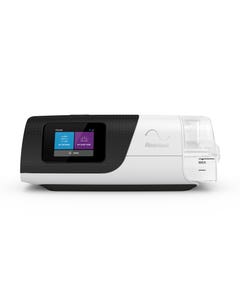Sleep Apnea and Heart Disease

Getting a good night’s rest is just important as diet and exercise in maintaining health. Poor sleep can impact the health of the cardiovascular system. Sleep disorders such as obstructive sleep apnea increase the risk of heart failure by 140 percent, the risk of stroke by 60 percent, and the risk of coronary heart disease by 30 percent.1 Patients with heart problems may not realize that their poor sleep habits may be harmful.
How Does Sleep Apnea Lead to Heart Failure?
The sporadic gaps in nighttime respiration caused by obstructive sleep apnea over time can put stress on the cardiovascular system. This continued stress increases the risk of heart failure, especially for someone with already compromised heart health. Untreated sleep apnea increases the risk of heart arrhythmias. These abnormal heart rhythms affect circulation and heart performance. It’s estimated that patients with sleep apnea are 2-4 four times more likely to develop heart arrhythmias than people without this condition.
Heart Diseases Due to Obesity Resulting from Sleep Apnea
Obesity is another factor affecting both heart health and sleep health. Being overweight increases the risk for many heart problems as well as the risk of sleep apnea. This combined heart and sleep problem can increase risk factors for many health issues. Obese patients are further compromising their overall health as their weight can lead to diabetes, hypertension, and high cholesterol levels as well as impacting their sleep, which worsens cardiovascular health.
Sleep Deprivation and Heart Failure
Sleep apnea like so many other sleep disorders interrupt healthy sleep or prevent it altogether. Consistent sleep deprivation begins to affect the heart without offering clear signs of damage. The body and the heart need to receive the proper re-energizing that a good night’s sleep provides. Without that recovery time, the heart works harder than ever to do its job. This stress on the heart can lead to stroke and heart attacks.
Sleep Apnea Affects Cardiovascular Disease
Many patients with and out without heart problems may not realize that their consistent sleep loss is impacting their heart health. Continued stress on the heart from lost sleep can affect patients who are struggling to manage an existing heart condition. Good exercise and dietary habits help. But if they are losing healthy sleep, then their heart and cardiovascular system are at risk. Knowing more about sleep apnea and if you have it, is the first step toward taking action to improve your sleep and heart health.
How to Treat Sleep Apnea to Reduce the Risk of Heart Failure
Addressing a sleep apnea problem begins with a diagnosis. Knowing you have sleep apnea means you can begin treatment using CPAP therapy. Using a CPAP machine, you can begin preventing the disruptive patterns of breathing that occur during sleep. Pressurized air from a CPAP machine keeps the airway open while you sleep so that respiration is normal and healthy. In the long term, better sleep can help improve heart health and reduce your heart failure risk.
Where Can I Buy a CPAP Machine for Sleep Apnea Treatment?
You can find CPAP machines for managing obstructive sleep apnea at The CPAP Shop. We offer a wide variety of products to help improve sleep health. Visit us online to select a CPAP machine that fits your needs. Our knowledgeable staff is here it help you learn more about healthy sleep and how a CPAP machine can make a difference. You can call us at 866-414-9700.
References
- Journal of Clinical Sleep Medicine. Obstructive Sleep Apnea and Cardiovascular Disease: Role of the Metabolic Syndrome and Its Components.
The CPAP Shop teamed up with Dr. Vidya Pai, an experienced sleep medicine specialist, to write this blog post. Our team of authors and medical experts frequently evaluate our blog posts so that readers can learn factual information and make knowledge-based decisions. Our blogs get constantly updated with the most accurate information to provide the most up-to-date facts and research.
Getting a good night’s rest is just important as diet and exercise in maintaining health. Poor sleep can impact the health of the cardiovascular system. Sleep disorders such as obstructive sleep apnea increase the risk of heart failure by 140 percent, stroke by 60 percent, and coronary heart disease by 30 percent.1 Patients with heart problems may not realize that their poor sleep habits may be harmful.
How Does Sleep Apnea Lead to Heart Failure?
The sporadic gaps in nighttime respiration caused by obstructive sleep apnea over time can put stress on the cardiovascular system. This continued stress increases the risk of heart failure, especially for someone with already compromised heart health. Untreated sleep apnea increases the risk of heart arrhythmias. These abnormal heart rhythms affect circulation and heart performance. It’s estimated that patients with sleep apnea are 2-4 four times more likely to develop heart arrhythmias than people without this condition.
Treatment Of Sleep Apnea In Reducing The Risk Of Heart Disease
There are a few treatment options for sleep apnea that can also help to reduce the risk of heart disease.
Application Of Positive Airway Pressure (PAP) Devices
Using a PAP device is the most common and effective treatment for sleep apnea. PAP machines deliver steady and constant pressurized air through a mask to a patient as they are sleeping to help keep the airway open. Using a PAP device prevents many symptoms and further health issues, including heart disease. Since sleep apnea is connected to heart problems, the help PAP devices deliver to patients improves their breathing, which results in better blood pressure and blood oxygen levels.
Surgery
A PAP patient could also receive surgery to help with their sleep apnea. A surgical procedure helps to restore airflow, which results in better and easier breathing throughout the night. A doctor will recommend surgery if a patient can not tolerate PAP therapy. Similarly to PAP devices, surgery opens the airways to improve sleeping which will also improve the heart, as a person’s blood pressure is better as well as their blood oxygen levels.
Doing Throat and Mouth Exercises
Throat and mouth exercises could also be a good option for those with sleep apnea. Although not as effective, a few simple exercises can strengthen the muscles around the airway, helping them to remain more open at night, resulting in less snoring and an improvement in sleep apnea symptoms overall. Stronger airways for better breathing throughout the night also help build a stronger and healthier heart.
Changes in Lifestyle
Doctors may also suggest changes in a person’s lifestyle to improve their sleep apnea and heart health. These change suggestions can include:
- Exercising frequently
- Eating healthier
- Losing weight
- Limiting alcohol
- Quitting smoking
Heart Diseases Due to Obesity Resulting from Sleep Apnea
Obesity is another factor affecting both heart health and sleep health. Being overweight increases the risk of many heart problems as well as the risk of sleep apnea. This combined heart and sleep problem can increase risk factors for many health issues. Obese patients are further compromising their overall health as their weight can lead to diabetes, hypertension, and high cholesterol levels as well as impacting their sleep, which worsens cardiovascular health.
Obstructive Sleep Apnea and Heart Failure
The majority of OSA patients that have been diagnosed and actually sought out sleep therapy treatment with a CPAP machine are fully aware of the potentially life-threatening conditions associated with OSA such as high blood pressure, stroke, and heart failure. Unfortunately, only a fraction of these patients understand how these diseases of the heart are fundamentally linked to sleep apnea.
Research Related to Sleep Apnea and Heart Failure
The reality is that ongoing research is showing a definitive link between heart failure and both types of sleep apnea – Obstructive Sleep Apnea (OSA) and the more rare Central Sleep Apnea (CSA). OSA is characterized by the relaxation of throat muscles in the back of the throat that momentarily cuts off breathing. CSA, a more dangerous condition, is the result of the brain’s failure to transmit signals to breathing muscles. A significant similarity between OSA and CSA is that they both lower necessary blood oxygen levels to dangerously low levels.
When the body’s oxygen level drops, carbon dioxide levels increase. The result triggers the body’s so-called “fight-or-flight” reflex whereby your brain tells your body to release adrenaline-like substances into the bloodstream. This in turn increases blood pressure.
These dramatic swings in blood pressure not only begin damaging the body’s blood vessel linings, but can also increase the mass of the heart, thicken the heart walls, and reduce pumping action. This ongoing stress on the heart will eventually lead to an increased risk of heart failure and other cardiovascular problems.
There is no definitive way to know what percentage of undiagnosed sleep apnea patients are also heart failure patients. As the various cardiovascular and sleep apnea medical communities begin to find the common ground, more patients who suffer from both conditions can be helped via the use of a CPAP machine.
Sleep Deprivation and Heart Failure
Sleep apnea like so many other sleep disorders interrupts healthy sleep or prevents it altogether. Consistent sleep deprivation begins to affect the heart without offering clear signs of damage. The body and the heart need to receive the proper re-energizing that a good night’s sleep provides. Without that recovery time, the heart works harder than ever to do its job. This stress on the heart can lead to stroke and heart attacks.
Obstructive Sleep Apnea Affects Cardiovascular Disease
Many patients with and without heart problems may not realize that their consistent sleep loss is impacting their heart health. Continued stress on the heart from lost sleep can affect patients who are struggling to manage an existing heart condition. Good exercise and dietary habits help. But if they are losing healthy sleep, then their heart and cardiovascular system are at risk. Knowing more about sleep apnea and if you have it, is the first step toward taking action to improve your sleep and heart health.
How to Treat Sleep Apnea to Reduce the Risk of Heart Failure
Addressing a sleep apnea problem begins with a diagnosis. Knowing you have sleep apnea means you can begin treatment using CPAP therapy. Using a CPAP machine, you can begin preventing the disruptive patterns of breathing that occur during sleep. Pressurized air from a CPAP machine keeps the airway open while you sleep so that respiration is normal and healthy. In the long term, better sleep can help improve heart health and reduce your heart failure risk.
OSA and Obesity
There is a major correlation between sleep apnea and obesity. That’s because the extra fat on a person’s body can deposit around the neck area, which narrows and restricts the airway, making it harder to breathe for those who are obese. Additionally, the extra fat around that area can result in loud snoring and worsen all of the symptoms of sleep apnea. To learn more about the relationship between OSA and obesity, read this blog post.
However, as mentioned above, certain lifestyle changes can help to improve sleep apnea. One major improvement is weight loss. Here are some easy ways to lose weight to not only improve sleep apnea symptoms but also your overall health.
Where Can I Buy a CPAP Machine for Sleep Apnea Treatment?
You can find CPAP machines for managing obstructive sleep apnea at The CPAP Shop. We offer a wide variety of products to help improve sleep health. Visit us online to select a CPAP machine that fits your needs. Our knowledgeable staff is here it helps you learn more about healthy sleep and how a CPAP machine can make a difference. You can call us at 866-414-9700.
References For Sleep Apnea and Heart Diseases
Journal of Clinical Sleep Medicine. Obstructive Sleep Apnea and Cardiovascular Disease: Role of the Metabolic Syndrome and Its Components.







